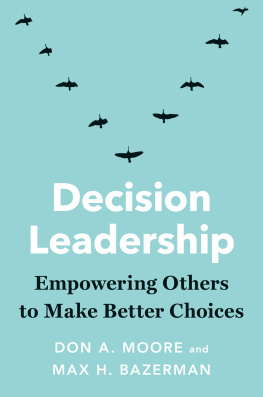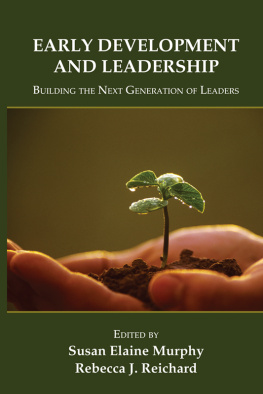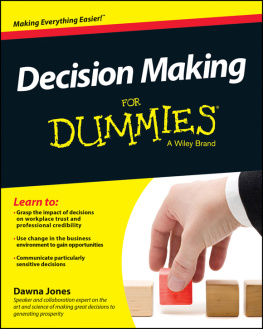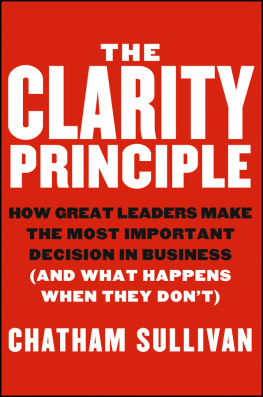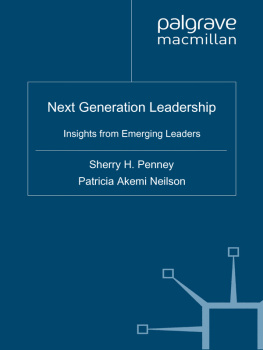Decision Leadership

Copyright 2022 by Don A. Moore and Max H. Bazerman. All rights reserved. This book may not be reproduced, in whole or in part, including illustrations, in any form (beyond that copying permitted by Sections 107 and 108 of the U.S. Copyright Law and except by reviewers for the public press), without written permission from the publishers.
Yale University Press books may be purchased in quantity for educational, business, or promotional use. For information, please e-mail (U.K. office).
Set in Gotham and Adobe Garamond types by IDS Infotech Ltd.
Printed in the United States of America.
Library of Congress Control Number: 2021946781
ISBN 978-0-300-25969-8 (hardcover : alk. paper)
A catalogue record for this book is available from the British Library.
This paper meets the requirements of ANSI/NISO Z39.48-1992 (Permanence of Paper).
10 9 8 7 6 5 4 3 2 1
To Sarah, Josh, and Andy
D A M
To Marla and all of my coauthors on the journey to learning the stuff in this book
M H B
Contents
Preface
We collaborated on a book entitled Judgment in Managerial Decision Making, first published in 1986 (and revised several times). That book helped introduce what is now commonly called behavioral economics: using psychology to understand behavior of economic consequence. The book shared exciting developments in the study of human judgment and decision making, and it was directed at audiences of students and practitioners who could put that knowledge to use making better decisions in their lives and in their work. The ensuing thirty-five years have brought important research progress and a huge increase in the fields public profile. Behavioral economics is now regularly covered by the press and popular media, with several scholars achieving what counts as celebrity status (at least for the nerdy denizens of the academy).
Daniel Kahnemans book Thinking, Fast and Slow generated a great deal of interest in practitioners. Thalers and Sunsteins Nudge allowed organizations, particularly governments, to think about how small changes in the environment could help people make better decisions. Dozens of fantastic scholars have conducted studies that demonstrate the powerful and useful application of insights from research.
As we considered writing a ninth edition of Judgment in Managerial Decision Making, we became convinced that rather than updating our existing book it would be more useful to connect the dots between decision making and leadership. Leaders not only make critical decisions themselves but also create and design organizations that influence the decisions of hundreds, thousands, or even millions. This book is for current and future leaders. We hope that you will use it to improve not just your decisions but also the decisions and lives of those around you.
Decision Leadership
Leading the Decisions of Others
Quarterbacks lead on the football field. They call the plays. They motivate their team members. And they lead off the field as wellthey represent their teammates in talks with coaches and managers. On September 1, 2016, Colin Kaepernick, the starting quarterback for the San Francisco 49ers, decided to lead his team in a different way.
As the 49ers and the San Diego Chargers stood for the national anthem along with fifty thousand fans, Kaepernick took a knee; his teammate Eric Reid joined him. By kneeling, Kaepernick intended respectful protest against racial inequality and police brutality in the United States. In the 49ers prior game against the Green Bay Packers, Kaepernick had sat on the bench during the anthem; afterwards, his teammate Nate Boyer, a military veteran, suggested that kneeling would better convey respect for the flag and the anthem while at the same time signaling defiance.
Kaepernicks actions drew both praise and criticism. He can speak out about a very important issue, said New Orleans Saints star quarterback Drew Brees. But theres plenty of other ways that you can do that in a peaceful manner that doesnt involve being disrespectful to the American flag. President Donald Trump condemned the protests: Wouldnt you love to see one of these NFL owners, when someone disrespects our flag, to say, Get that son of a bitch off the
Kaepernick left the 49ers in March of 2017 in search of a team that would appreciate him more. However, he received no offers and did not play in a single NFL game in 2017. In October of 2017 Kaepernick filed a grievance accusing the teams of the NFL and their owners of colluding against him. The league bolstered his case by making him no offers in 2018. In February 2019 Kaepernick reached a confidential settlement with the league. But that settlement did not guarantee him a place on the field. Kaepernick did not play for the NFL in 2019 or in 2020.
While the NFL was treating him like a pariah, others celebrated Kaepernicks courage. In 2018, well after Kaepernicks on-field protests, Nike made Kaepernick the face of the brand by releasing an ad with the line, Believe in something. Even if it means sacrificing everything. The ad, though controversial, was undeniably successful at increasing Nikes visibility. A year later Nikes Dream Crazy campaign featuring Kaepernick won an Emmy Award. Kaepernick also won awards for his activism, including accolades from Sports Illustrated, the American Civil Liberties Union, Amnesty International, Harvard University, and even, ultimately, the San Francisco 49ers.
After George Floyds brutal murder at the hands of Minneapolis police in 2020 Kaepernicks profile rose again. At first Brees repeated his criticism of Kaepernick, saying, I will never agree with anybody disrespecting the flag of the United States.
Was Kaepernicks kneeling an act of leadership? It certainly differed from a motivational speech, announcing a mission statement, or rallying the troops. And it isnt captured by Thomas Carlyles great man theory of leadership. In 1840, the Scottish philosopher posited that great leaders are born, not made. Endowed with the right mix of abilities, traits, and divine inspiration, great men, Carlyle believed, leave their marks on history. Although his theory held sway for more than a century, it turned out to be as vacuous as it was sexist; hundreds of studies seeking to identify the distinctive attributes of great leaders ended in disappointment. Eventually, universities quit teaching the concept, which had little supportive evidence and offered even less useful guidance to aspiring leaders. The great man theory has rightly withered, along with many other fads that have passed through the study of leadership over the past century, due to its lack of usefulness.
In this book we aim to define leadership in a new way, one grounded in the belief that leaders success depends not only on their ability to make good decisions but also on their ability to help others make wise decisions. Colin Kaepernick used his high-profile position to direct the nations attention to the discrepancy between our ideals and reality. His motivation was less immediate self-interest than the welfare of our diverse society. In doing so he sparked a movement whose ripple effects continue to spread.
We believe that leaders need to broaden their focus beyond making effective personal decisions to building teams, organizations, communities, and societies that empower everyone. In our view, great leaders create the norms, structures, incentives, and systems that allow their direct reports, the broader organization, consumers, investors, and other stakeholders to make decisions that maximize collective benefit through value creation. By this definition Kaepernicks kneeling was an act of leadership that fueled the protest movement of 2020, which in turn has inspired individuals and organizations to fight for changes aimed at promoting racial justice. Kaepernicks leadership was evident at protests in the summer of 2020 when protesters, rather than clashing with police, knelt before them.
Next page
